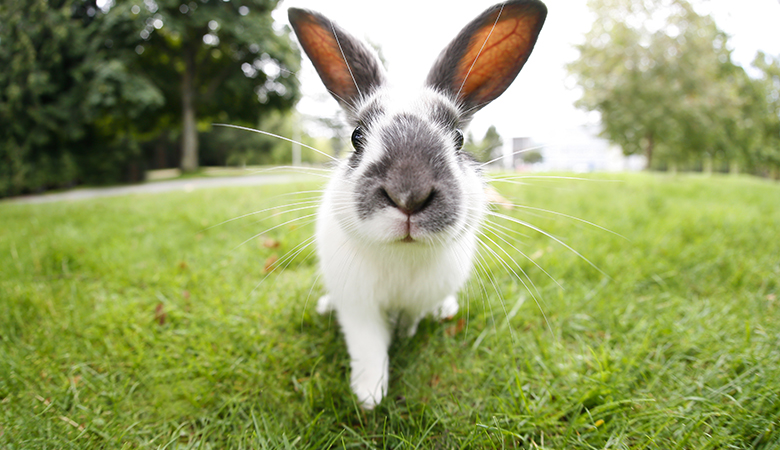Vaccinating your rabbit against Myxomatosis and VHD
Written by Noa |
Rabbits are among the top 10 most popular pets in the Netherlands. They are still often chosen as pets for children. Read here what you should consider when keeping a rabbit as a pet.

Rabbits are susceptible to two dangerous contagious diseases: Myxomatosis and VHD. What are these diseases, and can you protect your rabbit against them? Read all about it in this blog article.
Myxomatosis in your Rabbit
Myxomatosis is a type of poxvirus that causes a severe, often fatal disease in rabbits. The virus is transmitted by mosquitoes and fleas. Sometimes the disease can also be spread to other rabbits through direct contact.
What symptoms does a rabbit with myxomatosis show?
Rabbits with myxomatosis develop swelling around the eyes, mouth, and anus. They may also develop lumps (myxomas) on the ears, around the mouth, and on the back. Pneumonia can also occur. Almost all rabbits die from a myxomatosis infection. Sometimes, only red swollen eyes and difficulty breathing are observed.
Can a rabbit with myxomatosis be treated?
Myxomatosis itself is not treatable. A rabbit can only be supported with good nutrition, forced feeding if necessary, pain relief, and treatment of any secondary infections with antibiotics. If a rabbit survives the infection, it will have 14-20 months of protection against new infections.
How can you prevent a myxomatosis infection in your rabbit?
As mentioned earlier, fleas are an important source of myxomatosis infections. Keep your rabbits flea-free! Also, make sure wild rabbits cannot get near your domestic rabbits. Use mosquito netting in the house or on the hutch to keep mosquitoes and flies away, as they can also transmit myxomatosis.
Besides these measures, it is important to vaccinate your rabbit against myxomatosis.
Viral Hemorrhagic Disease (VHD) in your Rabbit
VHD is another deadly viral disease that can occur in rabbits. The disease is known by various names, including RHD, RVHD, VHS, or RCD. VHD is caused by a calicivirus, specifically the Rabbit Hemorrhagic Disease Virus (RHD virus). There are two known variants in rabbits: the ‘classic’ virus known as RHD 1, and since 2015, a variant known as RHD 2. The latter has become the most common strain in Dutch rabbits in recent years.
VHD is highly contagious among rabbits and is spread through direct contact between rabbits, as well as contaminated materials such as hay, picked grass, birds, shoe soles, and biting insects like mosquitoes and fleas. The virus is shed through rabbit droppings and urine and can survive in the environment for a long time.
What symptoms does a rabbit with VHD show?
Rabbits with VHD almost always die. The disease progresses rapidly. The virus causes a liver infection that leads to bleeding in the lungs, liver, and intestines, ultimately resulting in the death of the rabbit. Often rabbits die without showing symptoms. This form of VHD is mainly caused by the RHD 1 virus.
There is also a chronic form of the disease, where rabbits die within 1-2 weeks from liver failure. This form is often seen with infections by the RHD 2 virus.
Interestingly, very young rabbits (younger than 6-8 weeks for RHD 1, and younger than 4 weeks for RHD 2) are not susceptible to RHD.
How can you prevent a VHD infection in your rabbit?
As with myxomatosis, it is important to protect your rabbit from fleas and mosquitoes and to prevent contact with wild rabbits. Also, avoid picking grass or other plants from areas inhabited by wild rabbits, and wash plants thoroughly before giving them to your rabbit.
If you want to use chemical products, always check carefully if they are safe for rabbits!
Besides the measures mentioned, vaccination against RHD 1 and 2 is very important.
Vaccinating your Rabbit
Since this spring, there is a new vaccine that protects your rabbit against myxomatosis, RHD-1, and RHD-2 with a single vaccination. The benefits of this vaccine are:
-
One vaccination, one injection protecting against Myxomatosis, RHD1, and RHD2
-
Your rabbit can be vaccinated from 5 weeks of age
-
Your (previously unvaccinated) rabbit does not need a booster to be protected
-
Your rabbit is protected for 12 months with this vaccine
Note: If your rabbit was previously vaccinated with another myxomatosis vaccine or has had a natural myxomatosis infection, the protection against RHD after one vaccination might be insufficient. A booster vaccination may then be necessary.
The new vaccine is called Nobivac Myxo-RHD PLUS. Ask your vet about it.
Of course, there may be reasons to hesitate about vaccinating your rabbit, for example if your rabbit experiences side effects or is chronically ill. Always discuss this with your vet.
If you have any questions, you can contact customer service or email veterinarian@vetsend.co.uk
Check out our small animal range here.



